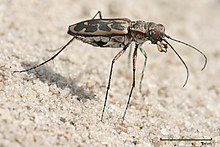虎甲
步甲科的一个亚科甲虫
| 虎甲亚科 | |
|---|---|

| |
| Lophyra sp | |
| 科学分类 | |
| 界: | 动物界 Animalia |
| 门: | 节肢动物门 Arthropoda |
| 纲: | 昆虫纲 Insecta |
| 目: | 鞘翅目 Coleoptera |
| 科: | 虎甲科 Cicindelidae Latreille, 1802 |
| 族 | |
|
Cicindelini | |
| 异名 | |
|
Cicindelidae Latreille, 1802 | |
特征
编辑虎甲虫通常有鼓出的大眼睛,长且细的腿和大的弯曲的弯下颌骨。它们的头部很大,驼背利于捕获地面上的昆虫。虎甲属和Tetracha往往色彩鲜艳,别的属通常是统一的黑色。
分布
编辑虎甲属(Cicindela)几乎遍布全球,其他属包括Tetracha、Omus、Amblycheila和Manticora ,Manticora属数量最多,主要生活在南非的沙漠。虎甲幼虫生活在1米深的圆柱洞穴。在热带地区的一些虎甲虫是树栖的,但大部分生活在地面上。它们居住在沿海和湖滨,通常在沙丘、黏土堤岸和林地小径,特别喜欢沙地[1]。
习性
编辑成虫和幼虫都是捕食性的。虎甲属昆虫通常是日行性动物,最热的天可能出现,其他属Tetracha、Omus、Amblycheila和Manticora都是夜行性。
行动迅速的成虫反应速度与家蝇相当。这种昆虫生性好斗,速度快。其最快的物种速度可达9公里/小时(5.6英里),相对于其身体长度,相当于人类速度770公里/小时,是前奥林匹克短跑选手迈克尔·约翰逊的22倍。[2]幼虫会在地上挖洞埋伏其内,等猎物走到其洞穴附近时会迅速冲出猎捕。至2005年,约有2,600物种被发现,印度和马来地区分布最广泛,其次为新热带区。[3]
参见
编辑脚注
编辑- ^ Werner, K. 2000
- ^ Cornell News, Jan. 16, 1998 When tiger beetles chase prey at high speeds they go blind temporarily, Cornell entomologists learn. [2011-12-02]. (原始内容存档于2012-12-13).
- ^ Pearson, D.L. & F. Cassola, 2005
- ^ Burdick, D.J. and Wasbauer, M.S. 1959. Biology of Methocha californica Westwood (Hymenoptera: Tiphiidae). Wasmann Jour. Biol. 17:75-88. Department of Environmental Conservation (页面存档备份,存于互联网档案馆)
参考资料
编辑- Further new country records of African Tiger Beetles with some taxonomical note (Coleoptera, Cicindelidae) by Peter Schüle. Entomologia Africana 15(2)2010.
- The Tiger beetles of Africa by Karl Werner, Taita Publishers 2000.
- A Quantitative Analysis of Species Descriptions of Tiger Beetles (Coleoptera Cicindelidae), from 1758 to 2004, and Notes about Related Developments in Biodiversity Studies by D.L. Pearson and F. Cassola. The Coleopterists Bulletin Vol 59, n°2, June 2005.
- Tiger Beetles of Alberta: Killers on the Clay, Stalkers on the Sand by John Acorn. University of Alberta Press, 2001.
- Tiger Beetles: The Evolution, Ecology, and Diversity of the Cicindelids by David L. Pearson and Alfried P. Vogler. Cornell University Press, 2001.
- A Field Guide to the Tiger Beetles of the United States and Canada by David L. Pearson, C. Barry Knisley and Charles J. Kazilek. Oxford University Press, 2005.